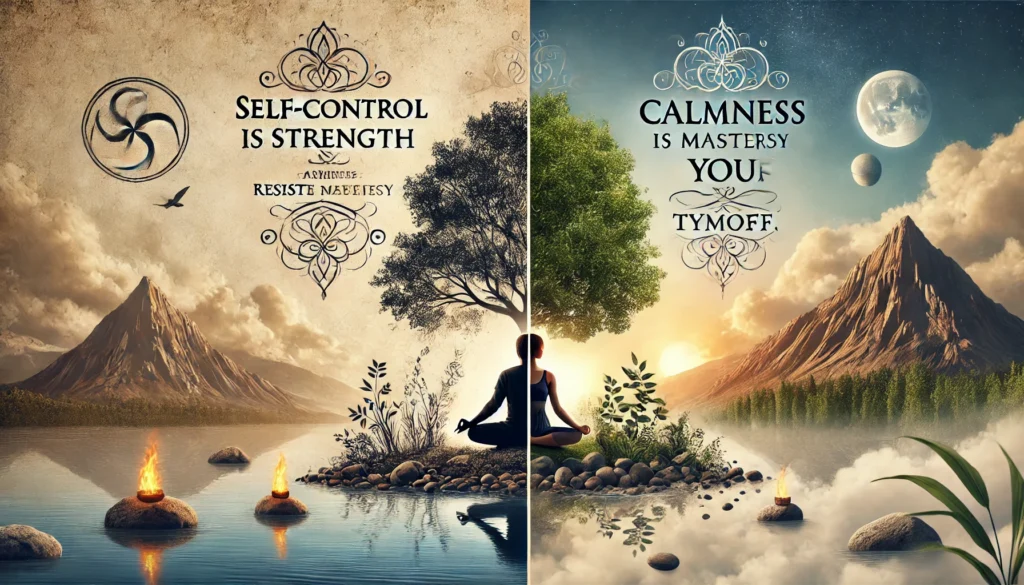In a world often dominated by external noise, distractions, and the chaos of modern life, the pursuit of inner peace and self-mastery stands as a timeless and universally revered goal. The phrase Self-control is strength. Calmness is mastery. You – Tymoff encapsulates this profound wisdom. Let’s delve into the depths of these concepts, exploring their significance, applications, and the ways they interweave to foster a fulfilling and balanced life.
The Power of Self-Control
Self-control is a fundamental pillar of personal strength. It involves regulating one’s emotions, thoughts, and behaviors in the face of temptations and impulses. This trait is crucial for individual growth, maintaining harmony in interpersonal relationships, and achieving long-term goals.
The Biological Basis of Self-Control
Self-control is rooted in the brain’s prefrontal cortex, responsible for decision-making, planning, and impulse control. Neuroscience research has shown that individuals with higher self-control exhibit greater activation in this area, allowing them to resist immediate gratifications in favor of more substantial, long-term rewards.
The Benefits of Self-Control
- Enhanced Focus and Productivity: Self-control enables individuals to stay focused on their tasks, reducing the tendency to procrastinate or be sidetracked by distractions. This results in higher productivity and the efficient accomplishment of goals.
- Improved Health and Well-being: People with solid self-control are better equipped to make healthy lifestyle choices, such as maintaining a balanced diet, exercising regularly, and avoiding harmful habits like smoking or excessive drinking. These choices contribute to overall well-being and longevity.
- Stronger Relationships: Self-control helps manage emotions and reactions in social interactions, leading to more harmonious and respectful relationships. It allows for constructive communication and conflict resolution, fostering deeper connections with others.
Developing Self-Control
- Mindfulness Practices: Mindfulness meditation and breathing exercises can enhance self-awareness and self-regulation. These practices train the mind to remain present and calm, even in challenging situations.
- Goal Setting: Establishing clear, achievable goals provides a sense of direction and purpose. Breaking down larger goals into smaller, manageable steps makes staying on track and maintaining self-discipline easier.
- Delayed Gratification: Practicing delayed gratification, such as saving money instead of spending it impulsively or waiting to eat until mealtime, can strengthen self-control over time. It teaches the value of patience and long-term planning.
The Mastery of Calmness
Calmness is often misunderstood as a passive state, but it is, in fact, a dynamic quality that requires mastery. It involves maintaining inner peace and composure amidst external chaos and stress. Mastery of calmness is not about avoiding challenges but facing them with a centered and resilient mindset.
The Psychological Underpinnings of Calmness
Calmness is closely linked to emotional regulation and stress management. It involves the ability to manage one’s emotional responses and maintain a state of equilibrium, even in the face of adversity. This skill is essential for mental health and overall well-being.
The Benefits of Calmness
- Stress Reduction: Calmness helps mitigate the harmful effects of stress on the body and mind. It promotes relaxation, lowers blood pressure, and reduces the risk of stress-related illnesses such as heart disease and anxiety disorders.
- Improved Decision-Making: A calm mind is better equipped to make rational and informed decisions. It allows for clear thinking, problem-solving, and the ability to weigh options objectively without being clouded by emotional turbulence.
- Enhanced Creativity: Creativity flourishes in a calm and relaxed state. When the mind is free from anxiety and distraction, it can explore new ideas, think innovatively, and approach challenges with a fresh perspective.
Cultivating Calmness
- Meditation and Relaxation Techniques: Practices such as meditation, yoga, and deep breathing can promote calmness. These techniques help quiet the mind, reduce stress, and enhance overall emotional well-being.
- Nature and Environment: Spending time in nature or creating a peaceful environment at home can significantly impact one’s sense of calm. Natural settings provide a sense of tranquility and can help reset the mind and body.
- Balanced Lifestyle: Maintaining a balanced lifestyle that includes adequate sleep, regular exercise, and healthy nutrition supports emotional stability and resilience. It provides a solid foundation for managing stress and maintaining calmness.
The Interconnection Between Self-Control and Calmness
Self-control and calmness are intrinsically linked. One reinforces the other, creating a positive feedback loop that enhances overall well-being and personal mastery. Let’s explore how these qualities interconnect and amplify each other.
Mutual Reinforcement
- Self-Control Enhances Calmness: Exercising self-control reduces impulsive reactions and emotional outbursts, which fosters a calm state. By regulating emotions and behaviors, individuals can navigate stressful situations more effectively and maintain composure.
- Calmness Supports Self-Control: A quiet mind provides the clarity and focus needed to exercise self-control. It allows individuals to pause, reflect, and make deliberate choices rather than reacting impulsively. This mindfulness enhances the ability to resist temptations and stay aligned with long-term goals.
Practical Applications
- Conflict Resolution: Self-control helps manage emotional reactions in interpersonal conflicts, while calmness allows for thoughtful communication and problem-solving. Together, they promote constructive dialogue and resolution.
- Professional Success: Self-control enhances productivity and goal achievement in the workplace, while calmness supports effective leadership and decision-making. These qualities are essential for navigating the complexities of professional life and achieving success.
- Personal Growth: On a personal level, the synergy between self-control and calmness fosters continuous growth and self-improvement. It enables individuals to overcome challenges, develop resilience, and achieve a balanced and fulfilling life.
The Role of “You” in Mastering Self-Control and Calmness
The final component of the phrase, “You – Tymoff,” emphasizes the personal responsibility and empowerment involved in mastering self-control and calmness. It highlights that these qualities are not bestowed upon individuals but cultivated through conscious effort and dedication.
Self-Awareness and Responsibility
- Self-Reflection: Regular self-reflection and introspection are essential for understanding one’s strengths and areas for improvement. Individuals can develop strategies to enhance self-control and calm by acknowledging personal challenges and triggers.
- Personal Accountability: Responsibility for one’s actions and choices is crucial for personal growth. It involves recognizing that self-control and calmness are within one’s control and committing to the ongoing practice of these qualities.
- Empowerment and Growth: Embracing the journey of self-mastery empowers individuals to take charge of their lives. It fosters a sense of agency and confidence, enabling them to navigate life’s challenges with resilience and grace.
Practical Steps for Personal Mastery
- Daily Practices: Incorporating daily practices such as mindfulness meditation, journaling, and goal setting can support the cultivation of self-control and calmness. Consistency and dedication are crucial to making these qualities a natural part of one’s life.
- Seeking Support: Engaging with supportive communities, mentors, or therapists can provide valuable guidance and encouragement. Surrounding oneself with positive influences fosters growth and reinforces the commitment to personal mastery.
- Continuous Learning: Personal mastery is a lifelong journey. Staying curious, open-minded, and committed to constant learning and self-improvement ensures ongoing growth and development.
Conclusion
“Self-control is strength. Calmness is mastery. You – Tymoff” encapsulates a profound truth about personal growth and fulfillment. By cultivating self-control, individuals develop the strength to navigate life’s challenges and achieve their goals. Through the mastery of calmness, they attain inner peace and resilience, allowing them to face adversity with grace. Ultimately, the journey of self-mastery is deeply personal, requiring dedication, self-awareness, and a commitment to continuous growth. Embracing this journey empowers individuals to lead balanced, fulfilling lives and make meaningful contributions to the world.

